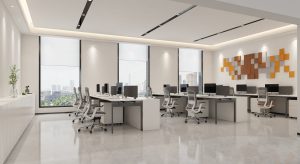In recent years, the Middle East has experienced significant economic transformation, driven by rapid urbanization, government-led diversification programs, and an increased focus on innovation. Among the many industries reshaping the region, the office furniture sector has emerged as a key player in creating modern, efficient, and sustainable work environments. Businesses in the Middle East are investing in ergonomic and eco-friendly office furniture solutions, aligning workplace design with employee well-being, productivity, and sustainability goals.
Changing Work Culture in the Middle East
The Middle East is no longer solely reliant on oil-based industries. With countries such as the UAE, Saudi Arabia, and Qatar leading national transformation plans, there has been a significant boom in financial services, technology, and creative industries. This diversification has created a demand for modern workplaces designed to attract global talent.
Employees today are looking for more than just a paycheck. They value work-life balance, flexible working models, and office environments that prioritize health and well-being. As a result, ergonomic office furniture—such as adjustable desks, supportive chairs, and collaborative workstations—is becoming increasingly popular. Companies that fail to meet these expectations risk lower employee satisfaction and productivity.
The Growing Role of Ergonomics in Employee Well-Being
Health and comfort are now considered essential aspects of workplace design. Prolonged sitting and poor posture contribute to fatigue, back pain, and reduced efficiency, issues particularly relevant in high-growth industries where long hours are common. Ergonomic office furniture addresses these challenges by:
- Improving posture: Adjustable chairs and desks provide better support for the spine.
- Reducing fatigue: Furniture designed for comfort reduces strain during long working hours.
- Boosting productivity: Employees perform better in supportive and comfortable environments.
This shift reflects a broader regional emphasis on employee well-being, aligning with global workplace trends.
Sustainability as a Driving Force
Another key trend in the Middle East office furniture market is the growing demand for sustainability. With global climate initiatives and regional projects such as Saudi Arabia’s Vision 2030 and the UAE’s Net Zero 2050 strategy, companies are actively seeking eco-friendly solutions. Office furniture manufacturers are responding by offering products made from recycled materials, energy-efficient production methods, and designs that promote durability and long-term use.
This shift toward sustainable office furniture is particularly strong among multinational corporations operating in the region, who must adhere to global ESG (Environmental, Social, and Governance) standards. It also reflects the Middle East’s broader commitment to positioning itself as a global hub for innovation and sustainability.
Regional Hotspots Driving Demand
The demand for modern office furniture is not uniform across the Middle East. Certain markets are showing especially strong growth:
- United Arab Emirates (UAE): With Dubai and Abu Dhabi leading as regional business hubs, demand for high-quality ergonomic furniture has surged, particularly in co-working spaces and multinational offices.
- Saudi Arabia: Driven by Vision 2030, the Kingdom is heavily investing in commercial infrastructure, including office spaces designed for global businesses.
- Qatar: As the country builds on its post-World Cup economic momentum, new office spaces are being developed to support finance and technology industries.
These hotspots are shaping the demand for office furniture and creating opportunities for both local and international suppliers.
Challenges Facing the Market
While the outlook for the Middle East office furniture industry is positive, several challenges remain. High import costs, fluctuations in global raw material prices, and the need for local manufacturing capabilities can impact affordability. Additionally, businesses must balance the demand for luxury office spaces with budget constraints, especially in small and medium-sized enterprises.
To overcome these challenges, many companies are partnering with regional distributors, focusing on modular furniture solutions, and adopting digital platforms to reach B2B customers more effectively.
Future Outlook: The Next Decade of Office Furniture in the Middle East
Looking ahead, the Middle East is poised to become one of the fastest-growing markets for office furniture globally. Several factors are expected to shape this growth:
- Hybrid work models: As companies adopt flexible working arrangements, demand for modular and adaptable office furniture will increase.
- Smart furniture technology: Integration of IoT in office chairs and desks—such as posture sensors and automated adjustments—will redefine modern workspaces.
- Sustainability at scale: Eco-friendly designs will shift from being a niche preference to a mainstream demand.
- Local manufacturing growth: To reduce costs and align with national industrial strategies, regional production capacity is expected to expand.
Businesses that stay ahead of these trends will not only meet market demand but also enhance their reputation as forward-thinking employers.
Practical Checklist for Businesses
To help businesses adapt to these changes, here is a downloadable checklist (placeholder) of key steps to consider when upgrading office furniture:
- Evaluate employee needs and conduct ergonomic assessments.
- Prioritize eco-friendly and durable materials.
- Invest in modular solutions to support hybrid work.
- Partner with reliable regional suppliers for cost efficiency.
- Incorporate technology-driven furniture where feasible.
Frequently Asked Questions (FAQ)
Q1: Why is ergonomic furniture important for Middle Eastern offices?
Ergonomic furniture reduces employee fatigue, improves posture, and enhances productivity, making it essential for fast-growing industries in the region.
Q2: How is sustainability influencing office furniture choices?
Companies are adopting eco-friendly materials and long-lasting designs to align with national sustainability goals and global ESG standards.
Q3: Which Middle Eastern countries have the highest demand for office furniture?
The UAE, Saudi Arabia, and Qatar are leading markets due to rapid commercial growth and national transformation programs.
Q4: What trends will define the future of office furniture in the region?
Hybrid work models, smart furniture technology, sustainability, and increased local manufacturing will shape the next decade.
Call to Action
If you are a business in the Middle East seeking to upgrade your workspace, now is the perfect time to explore ergonomic and sustainable office furniture solutions. Contact Becy Furniture today to discover customized options designed to meet the unique needs of your employees and align with your company’s growth goals.





